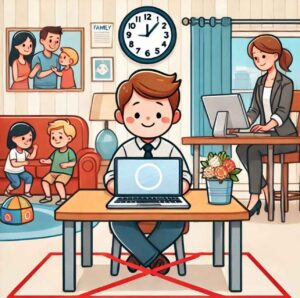Welcome Blessings!
(Tap 🔽 to see more topics!)


Work-life balance isn’t about having a perfectly divided day where you’re half robot at work and half super-parent at home. Think of it more as finding that sweet spot where you feel genuinely good about your job and have the energy to enjoy your life outside of it. It’s about feeling happy and productive in your career and personal life without feeling like you’re constantly running on empty.
We all know that’s easier said than done. The world seems to throw a never-ending pile of tasks and responsibilities at us, and it’s easy to feel like you’re drowning. Deadlines loom, meetings pile up, and suddenly, you’re wondering where your free time went. If you’ve felt that creeping sense of burnout or nagging guilt for not being ‘present’ enough, no worries—that’s a normal feeling, and it’s completely understandable in today’s demanding world.
The good news is you can take back control. There’s no magic bullet, but practical strategies can help you find your balance. Think of it as creating a custom-fit lifestyle that lets you thrive in your career without sacrificing your well-being. To help you get started, here are 10 straightforward ways to reclaim your time and energy and breathe a little easier.
Look, you’ve gotta draw a line in the sand. It’s about knowing what you won’t budge on and then ensuring everyone else knows it, too. Seriously, this is a game-changer for work-life balance.
Take one of my students, Calista, for example. She’s a marketing manager and a mom of two. She figured out that her family time would just vanish if she didn’t guard it. So, she blocks off those hours on her calendar, and her team knows to respect that. It’s like putting a “Do Not Disturb” sign on your personal life. If you don’t do it, trust me, nobody else will.
You’ve probably heard it before… planning helps. It’s true, especially when trying to juggle work and life. But you’ve gotta stay flexible too. Because, let’s face it, life throws curveballs. You know, like that sudden meeting that pops up when your kid gets a fever, or just those last-minute changes that throw your whole day off. Remember, you want a map but must also be ready to take detours. Simon, a software engineer and dad of three, lives this every day. He’s figured out a system that works for him:
Plan your day, but don’t treat it like it’s written in stone. Be ready to adjust. Being flexible is just as important as being organized.

You don’t have to carry the world’s weight on your shoulders. Building a solid support system can make a huge difference in finding that elusive work-life balance. It’s about recognizing that asking for help isn’t a weakness; it’s a smart move. Having people you can lean on lightens your load and reduces stress. That could mean family, friends, colleagues, or anyone with your back. Take Jo Ann, for example. She’s a single mom working a tough factory job and knows her support network’s value. She says:
Jo Ann’s story shows us that having those support systems isn’t just lovely. It’s essential for maintaining one’s sanity. Also, it’s about building a community that helps one thrive at work and in one’s personal life.
Trying to please everyone is tempting, but your time is like gold, and you only get so much of it. Many have difficulty saying ‘no’ because those people don’t want to disappoint anyone. But if you’re always saying ‘yes,’ you’ll end up stretched too thin and stressed out. Seriously, think of your time like a bank account.
If you spend all your energy on things that don’t matter to you, you will feel drained, like you’ve emptied your emotional bank account. You wouldn’t throw your money away on things you don’t need, would you? So, treat your time the same way. Invest it in the things that truly matter to you, make you feel good, and help you reach your goals. Learning to say ‘no’ is about protecting your peace and ensuring you have enough energy for what’s important.
It’s easy to let work bleed into your personal life, especially with so many working from home. Setting a precise ‘clock out’ time is a game-changer.
Treat your end-of-day routine like a real, physical end to your workday. This will help you transition smoothly into your time so you can enjoy your evenings and weekends without work hanging over your head.
Life’s way more than just clocking in and out. Seriously, we can all fall into that trap of work, eat, sleep, repeat, and suddenly, you realize you haven’t done anything fun in ages. But those hobbies and interests you love? They’re not just ‘nice to haves’. They’re crucial for keeping your head happy and healthy.
Making time for hobbies is reminding yourself that you’re a human with passions, not just a worker bee. Whether it’s dusting off that old guitar or finally trying that pottery class, carve out some ‘me time’… you deserve it!
Your health is like the foundation of a house. If it’s cracked, everything else starts to wobble. We often push sleep, good food, and exercise to the back burner when work gets crazy, but that’s a fast track to feeling drained. You’ve probably heard the saying, ‘You can’t pour from an empty cup,’ and it’s so true. Taking care of yourself isn’t a luxury; it’s a necessity. Treat it like any other necessary appointment, one you wouldn’t skip. Even small changes can make a big difference. Try incorporating these simple habits:
Remember, your body and mind are the engines powering everything you do. Keep them running smoothly, and everything else will fall into place more efficiently.

Our phones buzz, our laptops ping, and we feel constantly bombarded with information. It’s a real challenge to just be present. All those notifications, emails, and social media updates constantly fight for our attention. However, setting aside specific times to disconnect can make a huge difference. It’s about allowing yourself to step away from the digital world and enjoy the moment, whether it’s spending time with family, pursuing a hobby, or relaxing. Just like you need sleep to recharge your body, you must also give your brain a break from the digital noise. Below are a few simple ways to reduce digital overload:
1. Designated “Tech-Free” Times.
2. Digital Detox.
3. Airplane Mode.
It’s all about finding small, manageable ways to reclaim your attention and give yourself the space to breathe.
You know what? Taking breaks isn’t being lazy. It’s being clever. Seriously, it’s about being productive.
So ditch the guilt! Taking those little breaks is taking care of yourself, and it will help you crush it at work and in your life.
We’ve been told success means grinding, pushing, and running ourselves ragged. But you know what? The real success includes feeling good, being healthy, and having meaningful connections with people we care about. It’s not just about the paycheck or the title. What does success look like for you? Not just at work but in your whole life. If chasing that promotion means you’re constantly stressed, missing out on family time, and feeling like a zombie, is it worth it? What makes you feel genuinely fulfilled beyond just hitting those career milestones? Maybe it’s:
It’s about figuring out what truly matters to you and then building your life around that. It’s your definition, your rules.

The thing is, work-life balance is not a finish line you cross and you’re done. It’s more like a garden you tend, constantly changing and needing a little tweak here and there. What works for you today might need adjusting down the road, and that’s perfectly normal. By setting boundaries, remembering to take care of yourself, and making choices that truly matter to you, you can build a good life at work and home. And remember, you’re not just working to live. But, you’re also living to enjoy the moments, big and small.
Take a deep, calming breath. Now, think about one tiny step to give yourself more breathing room. It could be turning off email notifications after a specific time or scheduling a walk in your lunch break. Whatever it is, that small change can make a big difference. Ready to start? Share your one small change in the comments below! Let’s inspire each other to find that work-life balance that feels just right. Voila! Until next time!